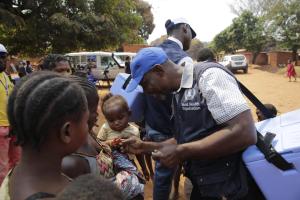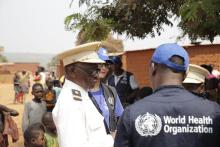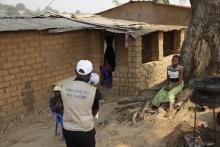Volunteering to protect children
In the early afternoon of 9 September, Catarino Francisco is coordinating the work of 12 monitors in the urban district of Ngola Kiluanje, whose task is to monitor the level of implementation of the polio vaccination campaign to the target group of children under five years.
Analysis of vaccination coverage data for bivalent oral polio and inactivated polio for the period from 2022 to the first quarter of 2023 shows that children's immunity to poliovirus types 1, 2 and 3 is currently low in Angola, estimated at less than 60%.
For this reason, the World Health Organization (WHO) and its partners in the fight against polio have joined forces with the Angolan government and carried out the first round of immunisation in all the country's provinces.
On 3 August 2023, WHO and UPRA signed a memorandum of understanding on 3 August 2023 opened the door to synergistic collaboration, where UPRA students were trained as independent monitor trainers, a vital initiative to validate the campaign's effectiveness.
After being introduced by the WHO, eighteen students travelled to Angola's provinces to form provincial teams of independent monitors, proving the mutual trust and collaboration between the two institutions.
It was Catarino's first experience of work of this kind. "It is exciting because it challenges me to pass on everything I had learnt in class and the previous training I had received from WHO,” he says.
This experience has allowed Catarino to gain the self-confidence to interact with the trainees and try to do a good job "above all because we are convinced that the work we do is for the greater good of the children."
During the two rounds of polio vaccination held in September this year, more than 5.4 million children between the ages of zero and four were vaccinated nationwide.
Despite the setbacks and challenges he experienced during the campaign, Catarino Francisco expected that they would be able to sensitise as many families as possible, pass on positivity to the community and get more support from parents.
"It is a very comforting experience. I think we significantly contributed to educating people, and I made the most of the opportunity the WHO gave me to serve my community and the country."
Neusa Branco, 25, is a medical graduate of UPRA. She coordinated the three municipalities and led four monitors per city.
"We started by receiving the training. Afterwards, I worked as a trainer and municipal coordinator. The monitors had the task of going door-to-door. We worked with the ODK Collect app, which has some questions for families to answer," she said.
This is not Branco’s first vaccination campaign. She was a vaccinator at a post-established at the university during COVID-19. As a health professional, she considers this another valuable experience to gain knowledge.
This student training initiative is part of WHO's aim to contribute to strengthening research capacities and the knowledge base of the academic sector, to improve the strategic use of health information and investment in support of the health agenda in Angola, says the Acting WHO Representative in Angola, Dr Humphrey Karamagi.


